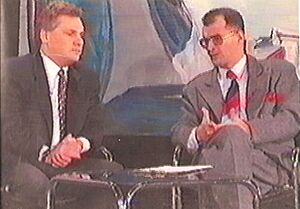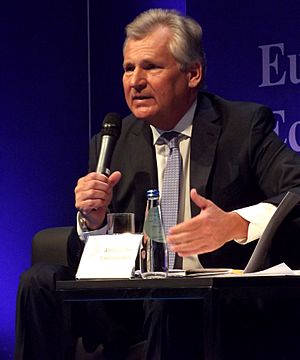Aleksander Kwaśniewski facts for kids
Quick facts for kids
Aleksander Kwaśniewski
|
|
|---|---|
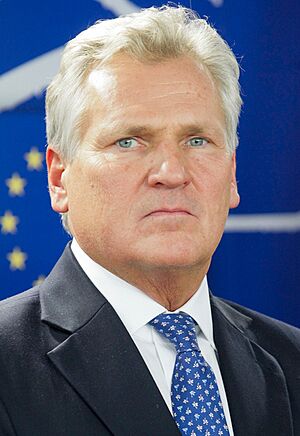
Kwaśniewski in 2019
|
|
| President of Poland | |
| In office 23 December 1995 – 23 December 2005 |
|
| Prime Minister | Józef Oleksy Włodzimierz Cimoszewicz Jerzy Buzek Leszek Miller Marek Belka Kazimierz Marcinkiewicz |
| Preceded by | Lech Wałęsa |
| Succeeded by | Lech Kaczyński |
| Leader of the Social Democracy | |
| In office 30 January 1990 – 23 December 1995 |
|
| Preceded by | Position established |
| Succeeded by | Józef Oleksy |
| Personal details | |
| Born | 15 November 1954 Białogard, Poland |
| Political party | Independent (1995–present) |
| Other political affiliations |
Polish United Workers' Party (1977–1990) Social Democracy (1990–1995) Democratic Left Alliance (1991–1995) Left and Democrats (2007) Europa Plus (2014) |
| Spouse |
Jolanta Konty
(m. 1979) |
| Children | 1 |
| Alma mater | University of Gdańsk (Did not graduate) |
| Awards | |
| Signature | |
Aleksander Kwaśniewski (born 15 November 1954) is a Polish politician who was the President of Poland from 1995 to 2005. He helped lead Poland through a time of great change after the end of communism in the country.
Before becoming president, Kwaśniewski was a minister in Poland's communist government in the 1980s. After communism fell, he led a new political party called the Social Democracy of the Republic of Poland.
He was elected president in 1995, defeating the famous Solidarity leader, Lech Wałęsa. He was so popular that he was re-elected in 2000 in the first round of voting. During his time as president, Poland's economy grew quickly. He also oversaw the creation of a new constitution in 1997. Two of his biggest achievements were leading Poland to join NATO in 1999 and the European Union in 2004.
Contents
Early Life and Political Start
Aleksander Kwaśniewski was born in Białogard, Poland. He studied economics at the University of Gdańsk but did not finish his degree. He became involved in politics as a student and joined the Polish United Workers' Party (PZPR) in 1977. This was the ruling political party in Poland at the time.
He was active in student groups and later worked as a journalist for youth newspapers. From 1985 to 1987, he was the Minister for Youth Affairs. He also took part in the famous Round-Table talks in 1989. These talks helped Poland transition peacefully from communism to democracy.
After the PZPR was dissolved in 1990, Kwaśniewski helped create a new party, the Social Democratic Party. He was elected to the Sejm (the Polish parliament) in 1991 and became a leading figure in the Democratic Left Alliance (SLD) coalition.
A Decade as President (1995–2005)
In 1995, Kwaśniewski ran for president with the slogans "Let's choose the future" and "Poland for all." He won the election, becoming the new president of Poland. After his victory, he resigned from his political party. He wanted to be seen as a president for all Polish people, not just those who voted for him.
His presidency focused on continuing Poland's move toward a modern, democratic country with a market economy. He worked well with different political groups, even those he had once opposed.
Major Achievements
One of Kwaśniewski's greatest achievements was the new Constitution of Poland, which was approved in 1997. This document replaced an old one from the communist era and became the foundation for modern Polish law.
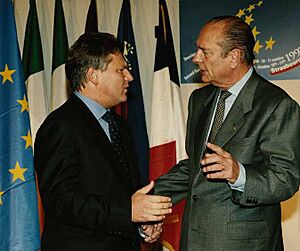
He also played a key role in Poland's entry into two important international groups:
- NATO (North Atlantic Treaty Organization): In 1999, Poland joined NATO, a military alliance of North American and European countries. This was a big step for Poland's security.
- European Union (EU): In 2004, Poland became a member of the EU. This allowed for easier trade and travel with other European countries and helped Poland's economy grow.
Kwaśniewski was also a respected leader on the world stage. He helped solve a political crisis in Ukraine in 2004, known as the Orange Revolution. He also worked to build good relationships with neighboring countries like Lithuania and Ukraine.
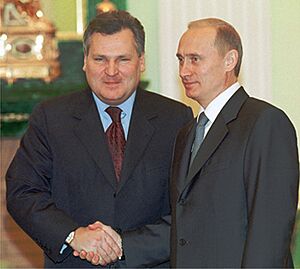
Second Term and Challenges
Kwaśniewski was easily re-elected in 2000. During his second term, Poland became a strong ally of the United States, especially after the 11 September 2001 attacks. Poland sent troops to support the U.S.-led mission in the Iraq War.

His presidency also had some difficult moments. He was sometimes criticized by his political opponents. For example, some of his decisions to pardon people were questioned. There were also political investigations, known as "Rywingate" and the "Orlen investigation," where he was asked to testify. He argued that the constitution protected him from being investigated by these commissions while he was president.
Years later, it was revealed that Kwaśniewski had agreed to let the American CIA use a secret site in Poland. He said he was told that anyone held there would be treated fairly under Polish law. This decision was later debated in Poland.
Life After the Presidency
After his second term ended in 2005, Kwaśniewski remained active in international politics and education.
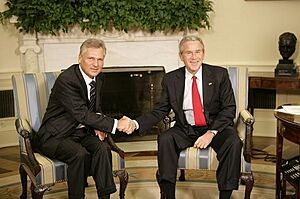
He became a professor at Georgetown University in the United States, teaching about European politics. He also co-founded the European Council on Tolerance and Reconciliation, an organization that works to promote understanding between different groups in Europe.
Kwaśniewski has been involved in many international missions. He led a European Parliament mission to Ukraine to observe the legal cases against former Ukrainian leaders. He also joined the board of a Ukrainian energy company, Burisma Holdings.
Personal Life
In 1979, Kwaśniewski married Jolanta Konty, who is a lawyer. As First Lady, she was very popular and active in charity work. They have one daughter, Aleksandra, who was born in 1981. Kwaśniewski has stated that he is an atheist.
Awards and Honors
Kwaśniewski has received many awards from countries all over the world for his work as a leader. Some of his honors include:
 Poland: Grand Master of the Order of the White Eagle
Poland: Grand Master of the Order of the White Eagle United Kingdom: Honorary Knight Grand Cross of the Most Honourable Order of the Bath
United Kingdom: Honorary Knight Grand Cross of the Most Honourable Order of the Bath France: Grand Cross of the Legion of Honour
France: Grand Cross of the Legion of Honour Japan: Grand Cordon of the Supreme Order of the Chrysanthemum
Japan: Grand Cordon of the Supreme Order of the Chrysanthemum Lithuania: Grand Cross of the Order of Vytautas the Great
Lithuania: Grand Cross of the Order of Vytautas the Great Germany: Grand Cross of the Order of Merit of the Federal Republic of Germany
Germany: Grand Cross of the Order of Merit of the Federal Republic of Germany- International: Golden Olympic Order from the International Olympic Committee
See also
 In Spanish: Aleksander Kwaśniewski para niños
In Spanish: Aleksander Kwaśniewski para niños
- Presidents of Poland
- 2005 Polish presidential election
Images for kids
-
President Kwaśniewski greets President of the U.S. George W. Bush.
-
Kwaśniewski with the President of Ireland Mary McAleese in Dublin, Ireland.
 | John T. Biggers |
 | Thomas Blackshear |
 | Mark Bradford |
 | Beverly Buchanan |


